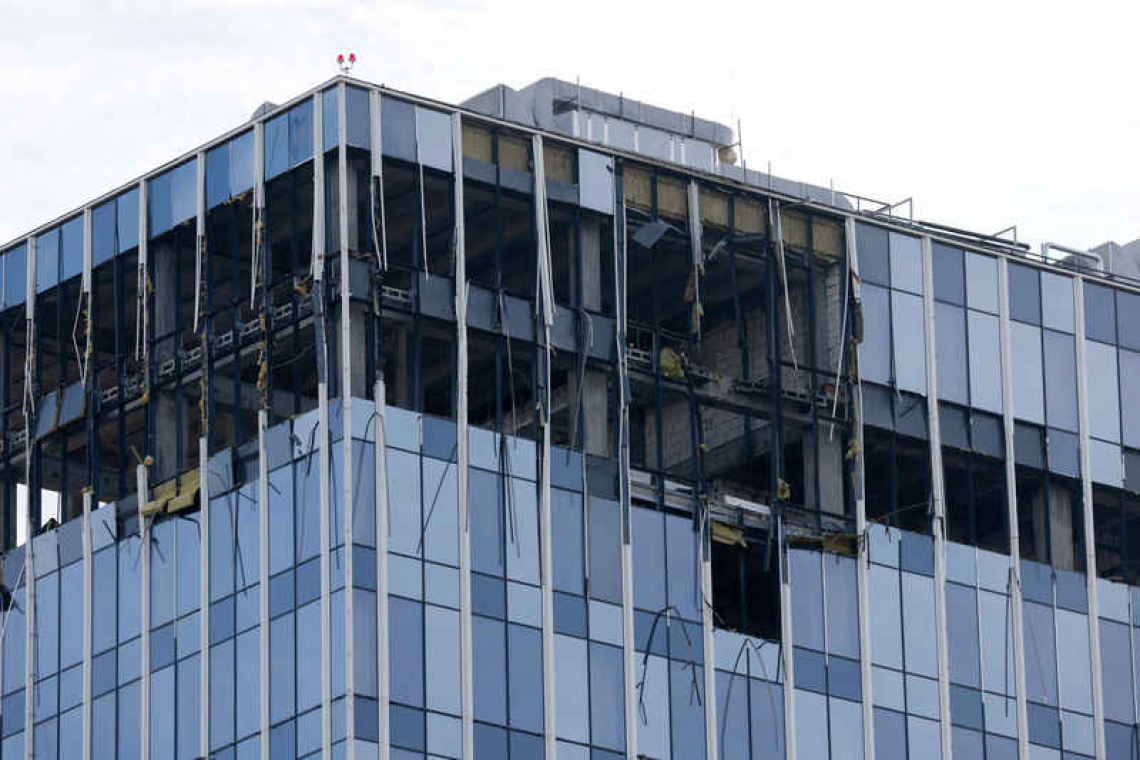MOSCOW--Russia spoke of taking harsh retaliatory measures against Ukraine after two drones damaged buildings in Moscow early on Monday, including one close to the Defence Ministry's headquarters, in what it called a brazen act of terror. Nobody was hurt in the attack, of which a senior Ukrainian official said there would be more, but one drone struck close to the Moscow building where the Russian military holds briefings on what it calls its "special military operation", a symbolic blow which underscored the reach of such drones. Roads nearby were temporarily closed, windows on the top two floors of an office building struck by a second drone in another Moscow district were blown out, and debris was scattered on the ground, a Reuters reporter who saw the aftermath of the incident said. "I was asleep and was woken up by a blast, everything started shaking," Polina, a young woman who lives near the high-rise building, told Reuters. A third "helicopter-type drone" which was not carrying explosives fell on a cemetery in a town outside Moscow, the Russian Foreign Ministry said in a statement in which it vowed that all those responsible would be found and punished. The Kremlin said it would press on with its campaign in Ukraine and meet all the aims of an operation which Kyiv and much of the West say is a brutal war of conquest. The Moscow drone attack, though not serious in terms of its human cost or damage, was the most high-profile of its kind since two drones reached the Kremlin in May. A swarm of 17 drones also launched attacks overnight on Crimea, which Russia annexed from Ukraine in 2014, the Russian Defence Ministry said, adding it had used anti-drone equipment and air defences to bring them down. The Russian-installed head of Crimea said an ammunition warehouse had been struck and a residential building damaged. "We regard what happened as yet another use of terrorist methods and intimidation of the civilian population by the military and political leadership of Ukraine," the foreign ministry said of the Moscow and Crimea drone attacks. "The Russian Federation reserves the right to take harsh retaliatory measures." Former Russian President Dmitry Medvedev, now deputy chairman of Russia's Security Council, said Moscow needed to broaden the range of targets it struck in Ukraine, adding what he called high-impact unexpected and unconventional ones. Ukrainian President Volodymyr Zelenskiy, whose government rarely comments on attacks inside Russia or on Russian-controlled territory, had on Sunday promised what he called "a retaliation to Russian terrorists for Odesa". That was a reference to days of deadly Russian missile strikes against targets in the port city which Moscow says are payback for a Ukrainian attack last week on the Crimean Bridge which killed the parents of a 14-year-old girl. Kyiv said on Monday that a Russian drone attack had destroyed Ukrainian grain warehouses on the Danube River and wounded seven people. "Today at night drones attacked the capital of 'the orcs' and Crimea," said Ukrainian Deputy Prime Minister Mykhailo Fedorov, using a derogatory term some Ukrainians use for Russians. "Electronic warfare and air defence are already less able to defend the skies of the occupiers." Writing on the Telegram messaging app, Fedorov, one of the officials spearheading Ukrainian efforts to create an "army of drones", added: "No matter what happens there will be more of this." Russia's defence ministry said its forces had used radio-electronic equipment to take out the two Ukrainian drones, forcing them to crash, thereby foiling what it called an attempted "terrorist attack". Russian Foreign Ministry spokeswoman Maria Zakharova told the RTVI TV channel Ukraine was guilty of what she called "an act of international terrorism".







